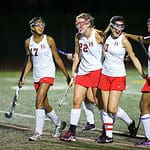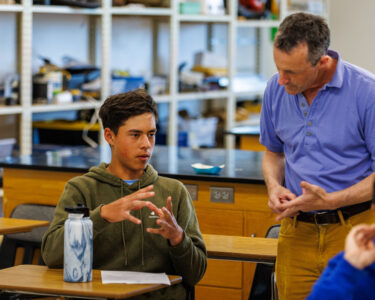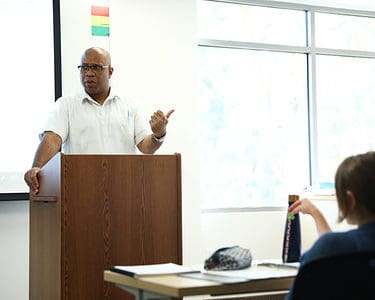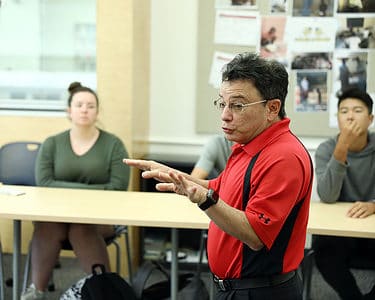By Zoe ’26
Though this time is difficult for us as students, I wanted to take some time to appreciate what all teachers are going through as well. I have created a couple of questions to ask teachers at both the middle school and upper school about how they are feeling, pros and cons of online teaching, tips, and what students can do to help.
What are some of the helpful things in Zoom that you enjoy using?
“There is a certain democratization to the spaces in the “Zoom Room.” Everyone has the same space. Everyone has the same chance to shine and to impress. I like that.” -Mr. Walch (Visual Arts, ISIR, and Performing Arts Teacher)
“The white board function and breakout room; not the chat. Chat is no good.” -Dr. Vourgourakis (Science Teacher)
“I enjoy using the new updated breakout rooms where students can manually enter into the room. I can assign each breakout room a specific topic or students can enter the rooms to work with people they know in the class.” -Ms. Chen (Science Teacher)
“Breakout rooms (both assigning them and allowing students to choose); they allow students to work in groups and allow me to check in with small groups without the pressure of the entire class focusing on particular students. And, the ability to share an iPad screen so that I can draw and mimic writing on a whiteboard. It’s also really easy for students to screen shot or for me to upload my drawings on to the Hub.” -Ms. Lee (Science Teacher)
What activities do you do in class to make things more fun for students?
“I have recently started asking all of my students to practice a specific scale or section of music unmuted. It sounds like cacophony, but a wonderful cacophony. We are playing music theory games as a group, working on note names, key signatures, and scales.”
-Ms. Wayne (Performing Arts Teacher)
“Feeding classroom animals (on camera), livestream telescopic viewing of the moon (outside of class time), watching videos, keeping students guessing what weird thing I might say or do next. These are all the sorts of things I do when we have school in person as well.” -Dr. Eitner (Science Teacher)
“My 5 year old, Ben, comes to class frequently. He shares non-physics stories with my students and tries to give them homework related to drawing pictures and reading books (the homework he gets from his kindergarten teacher). I also try to do hands-on activities and labs with students whenever possible.” -Ms. Hutchison (Science Teacher)
“Labs designed for home settings, videotaped labs to mimic classroom experience, virtual simulations, projects, jeopardy” -Ms. Lee (Science Teacher)
“I think I try a little extra hard on Zoom to be silly and to talk to students personally, just to make it a more human experience. I’m pretty goofy in the classroom in person too but making students laugh on Zoom is extra rewarding because being on Zoom all day can be dreary so it feels important. Of course, with the microphones off, I don’t get as much feedback as in person but I can still see when students are smiling 😊. Physics is challenging, of course, but I want it to be fun too.” -Mr. Reiner (Science Teacher)
Is there anything on zoom that you like that we wouldn’t have in real person?
“Emoji reactions…I’ll really miss those. Maybe I’ll make them on sticks that everyone can hold up when we return to the classroom.” -Ms. Hersey (Librarian and KITS Teacher)
“The anonymous polls in zoom are a great benefit. I feel like students can be more honest with how they feel.” -Ms. Eitner (Science Teacher)
“You can have fun filters or backgrounds! Also, the chat function which can help more introverted students become more engaged and participatory in a topic.” -Ms. Salmon (Assistant Director of Admission)
“Since I’m already on my computer, and since it is so fast to share my screen, I’m more likely to share a website, image, or video with students on Zoom than I would be in a classroom. When students schedule a meeting with me, I set up a Zoom meeting that automatically gets added to my calendar and the student’s Outlook calendar. So far, this makes it less likely that we will forget about the meeting. Also, none of us are wearing shoes during class, which my classes have decided is a big advantage. And I get to meet my students’ pets. And Ben can come to my classes regularly (and wander off when he gets bored).” -Ms. Hutchison (Science Teacher)
Overall, how do you feel about this whole experience? What are some of the biggest problems you have ( students, the Hub, Zoom, etc…)?
“As a teacher, we are constantly evaluating students’ understanding, which includes listening to a group discussion or looking over a student’s shoulder when working on a lab or a worksheet. It is hard to evaluate a student’s understanding over Zoom as I can only see their faces and not what they are working on.” -Ms. Chen (Science Teacher)
“Overall, I dislike it quite intensely, but given the circumstances, I think we are not only doing the best we can, but doing quite well. That is thanks to great efforts on the part of students and teachers alike.” -Dr. Vourgourakis (Science Teacher)
“The hardest part for me with remote learning is finding time to informally connect with my students. If we all look back on any of our favorite classes in school, the vast majority have one thing in common; you felt a connection/understood by the person teaching the class. This is an important step in the learning process. If you feel comfortable and safe with the person presenting the material, it becomes much easier for you to pick up on the concepts they are teaching. Right now, I talk a lot with the whole class, but I find it challenging to create opportunities to speak with my students individually to get to know who they are outside of the math classroom.” -Mr. Hoffman (Mathematics Teacher)
“I really, really, really miss seeing all of the students in person. I miss the sound of the bands playing as a whole. I miss the experience of hearing and feeling the whole ensemble improve together. I miss seeing my colleagues every day. I like being able to sleep a little later and I like not having to drive to work so early in the morning.” -Ms. Wayne (Performing Arts Teacher)
“It’s simple. Zoom Fatigue. It’s simply more exhausting both to teach and to learn on Zoom. I don’t begin to understand all the reasons why, but the truth is that it’s just plain exhausting — and often enervating. “ -Mr. Walch (Visual Arts, ISIR, and Performing Arts Teacher)
Do you have any tips for students to help them strive in their classes (study tips, focus tips, etc…)?
“Ask and answer questions; stay engaged. Also, would it kill you to have the camera positioned so that I can see your entire face and not just your mid-nose and up? What’s that about? You see yourselves, right? So…..” -Dr. Vourgourakis (Science Teacher)
“Overall, I think Harvard-Westlake students have done, and are continuing to do, a fantastic job of rolling with the punches, participating in class, keeping a positive attitude, and really trying to learn Physics. I can’t imagine a population of students handling it any better. The one suggestion I might offer students is not to hesitate to ask questions. HW teachers want to help you learn, and we definitely notice that the students who “bother” us, ask questions in class, ask for help in breakout rooms, ask for meetings outside of class seem to be learning more and doing better than the students who hang back and stay quiet. But we trust that you are all doing your best!” -Mr. Reiner (Science Teacher)
“I think the best piece of advice I have heard from both students and faculty is use your planner! Writing out to-do lists for each day is a great way to start the morning off. Also, forward thinking – making sure you are giving yourself enough time to finish a project/paper or study for a test. If you are struggling to maintain a healthy school/life balance, maybe even scheduling time away from your computer/time to do something that makes you smile. “ -Ms. Salmon (Assistant Director of Admission)
“My number one recommendation for students is to meet with their teachers outside of class as often as possible. Remote learning can be so challenging and the more vocal students are with how things are going, the easier it is for us as teachers to help. The one guarantee I can make is every teacher here at HW wants to help and wants to see every one of their students’ succeed. In my opinion, setting up meetings outside of class is one of the best ways to ensure this happens. “ -Mr. Hoffman (Mathematics Teacher)
“During class – turn off your cell phones, don’t play video games, don’t browse the internet or shop online, and only turn on your email if necessary to receive classroom materials. In other words, try to conduct yourself like you would in the classroom. In general – hang in there and do your best, try to stay positive and don’t lose your sense of humor if at all possible. Life is a long journey, the current circumstances will change.” -Dr. Eitner (Science Teacher)
What are some things you think students could improve on in class?
“Honestly, I haven’t really seen any certain trends in this regard. Students have been attentive even when they have had to keep their cameras off, and I feel like despite the distance, I’m getting to know who my students are…and hopefully, they are getting to know each other.” -Ms. Hersey (Librarian and KITS teacher)
“Being engaged is critical to making class fun for everyone. When people turn on their mics and speak, we can have a good time. When they are silent, class can be tough. I have one class where people speak up and we laugh a lot. It just takes a student or two, then the rest feel welcome to as well. “ -Ms. Eitner (Science Teacher)
“I wish that students would feel comfortable talking in a breakout room so that they can collaborate with other students and make new friends.” -Ms. Chen (Science Teacher)
“Speaking up more (or using the chat function to show engagement). It’s more difficult to check on individual student progress on Zoom without putting pressure on students, so anything students can do to show their engagement and participation would be ideal.” -Ms. Lee (Science Teacher)
“My students are remarkably supportive and accommodating and on the whole they’re giving it their best. I’m trying to do the same. I have no complaints. I have only hopes — that WHEN IT IS SAFE–we can return to the real world.” -Mr. Walch (Visual Arts, ISIR, and Performing Arts Teacher)
So again, take some time to appreciate your teachers. As hard as this is for us, it’s hard for them too, and we must take that into consideration when we get frustrated or mad for assignments not being where they’re supposed to, emails not being answered immediately, etc… So let’s be as patient with our teachers, as they are with us!





